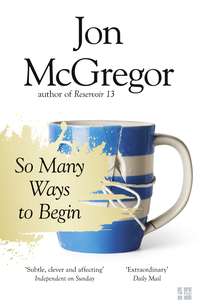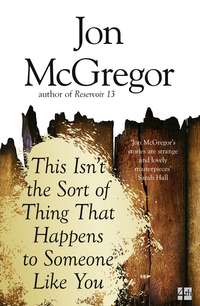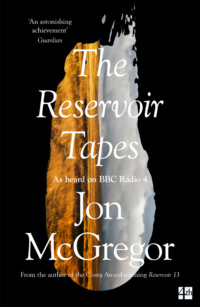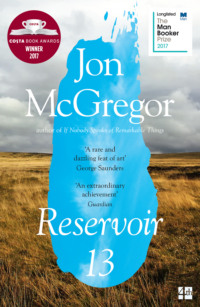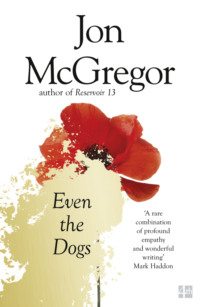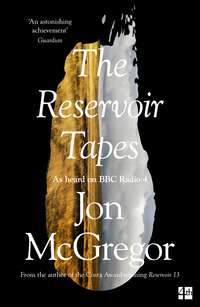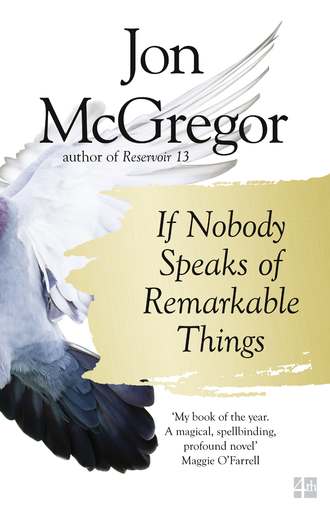
Полная версия
If Nobody Speaks of Remarkable Things
It’s worse in the city, with all the dust and the dirt, and it’s worse in the summer, with the long bright days, but usually it’s bearable, usually he doesn’t notice and he just keeps blinking away that gritted feeling. And if it gets too much, like it has now, he comes to his bathroom and bathes his eyes, and it’s a relief like finding a spring welling up in the desert.
He puts the eyedrops back into the cabinet, scratching the back of his hand, he picks up the camera and the selfportrait and returns to his bedroom, he wonders what else he might hide away with this collection. And he thinks about the girl at number twenty-two.
In the street, the front door of number thirteen is swinging gradually open, a young boy who can barely reach the doorhandle is peering around the door, his hair is sticking up and he is still wearing his pyjamas. He climbs onto a bright red tricycle which is waiting for him on the front path, he pushes all his weight onto the pedals and he creaks out of his garden and onto the main pavement. He looks back at the still open front door, he looks ahead of him to the main road, he puts his head down and he pedals, slowly at first, bumping and wobbling over loose paving slabs, picking up speed.
A streetcleaner whirrs past, brushes spinning and skidding across the tarmac, grit and glass and paper skipping up into its innards. The driver stares sleepily ahead, sunglasses curled across his face, lips mouthing the words of the song on the radio, I’ll be there for you, when the rain starts to fall. As he passes number nineteen he glances across at a girl sitting on the garden wall, a girl in a red velvet dress wearing very tall boots, she has her face arched up to the sky and a boy in wide trousers is gently kissing the tight curve of her throat. The streetcleaner whirrs away around the corner and the girl takes the boy’s hand and bites his little finger. He makes a noise, a soft noise and his eyes are closed and his stomach is like it was left behind over a humpbacked bridge and she says shall we go now and they both stand.
They hear voices then, shouted voices crashing down from the attic flat of number twenty-one, a woman’s voice shouting no but listen will you, listen to me, it’s not okay is it you shit you weren’t thinking about me were you you just went off out and did what you wanted to do it’s always about what you want isn’t it you selfish fucking wanker and what about me what about me she screams and the woman between the washing in next-door’s backyard stands and wonders how these people manage to shout at one another so much and still walk in the street with a hand in a hand. Shut up says the man’s voice, just shut up, shut up shut up will you please shut the fucking fuck up please? and his voice rises and rises until it sounds almost like the woman’s and it cracks and it breaks.
The girl and the boy outside, they look at each other and they hurry away down the road, and when they turn the corner the street is empty and quiet again.
The street is empty and quiet and still, the light is brightening, shadows hardening, the haze of dawn burning away. The day will soon burn with a particular brightness, hot and lethargic and tense. Later, it will rain, hard, suddenly, and the hot tarmac will steam and shine as water streaks across the surface into the gutters. And windows will be hurriedly closed, and people will stand in doorways, in shocked silences. But now, in this early beginning, it is dry, and the street is beginning to warm, and people sleep, or lie restlessly awake, or make love and sleep again.
Chapter 5
The day after speaking to Sarah I tried telling my mother.
I took the phone into my room, I sat on the floor with my knees pulled up into my chest and I started to dial the number.
I looked at a photograph on the wall, taken that summer, taken a few days before it happened.
Half a dozen of us, huddled together in a front garden, ashtrays and cushions spread across the grass, a speaker mounted in the front-room window, a beanbag spilling its beans across the pavement.
It’s a photo that makes us look young, it makes all of us look very young.
Our faces taut and shining, grinning awkwardly, squinting into the sunlight, everyone’s arms around everyone else.
Waving cans of beer as though they were novelties.
Looking like we thought everything was going to last forever.
I put the phone down before it started ringing, and I looked at the other pictures.
The photo of Simon must have been taken the same day, the day he left.
He’s sat in the front passenger seat of his dad’s car, window wound down, waving.
His dad’s at the back of the car, leaning all his weight on the boot, trying to get it closed against three years’ worth of possessions.
Against duvets and pillows, a stereo, a television, books and magazines and folders full of notes.
Against plates, saucepans, cutlery, a shoebox full of halffinished condiments, a food processor with the attachments missing.
A box of CDs, a box of videos, a box full of photographs and postcards and letters.
And a standard lamp, which he bought in a junk shop to make his room look civilised, lunging over his shoulder from the mess behind him.
All of it squeezed into his dad’s car, and he sits there and smiles and holds his open hand up beside his face.
In the background there’s a boy on a tricycle, staring.
There’s a photo of me and another girl, Alison, and I can’t remember who took it.
I’m standing next to her, pointing, shocked and laughing, and I’m surprised to see how similar I look, really, the same short blonde hair, the same small square glasses.
Alison’s pulling a wideopen face at the camera, freshly studded tongue flaring out of her mouth, fingers curled out like cat-claws.
And I’m pointing at her tongue and looking right into the lens, looking right out at myself these few years later, with a telephone in my hand, unable to dial.
I sat there thinking about the day she’d got it done, talked into it by the boy with the ring through his eyebrow who lived in her house, how she kept changing her mind all morning.
Eventually she went to a place round the corner, an upstairs place with a sign on the door saying no children no spectators.
It was a week before she could speak properly again, and then all she talked about was how excited and pleased she was with it.
She kept sticking her tongue out at men in the pub, just to see how they’d react.
By the end of the summer she was saying she might have to take it out to get a job.
It was a strange time.
People were slipping out of the city unexpectedly, like children getting lost in a crowd, leaving nothing but temporary addresses and promises to keep in touch.
I didn’t know what to do, there was a feeling of time running out and a loss of momentum, of opportunities wasted.
It was a good summer, long and hot, the days cracked open and bare, but it was hard to enjoy when it felt so deadended.
We spent our days on the front doorstep, circling job adverts with optimistic red felt-pens, trying to make plans, talking about travelling, or moving to London, or opening a cafe, each plan sounding definite until the next morning.
I don’t think any of us had the confidence, not for the sort of plans we were making, not for all those websites and fashion boutiques and doughnut shops.
A time of easy certainty had come to an end, and most of us had lost our nerve.
We used to sit on those front steps long into the evenings, long after the conversations had faltered, dragging our duvets downstairs when the stars finally squeezed out, flicking the ringpulls of empty beercans, blowing tunes into empty wine bottles.
Wondering what to do next.
Most of the photos I’ve got were taken in that last week, rushing around, trying to make up for three unrecorded years.
Pictures of the house, my bedroom, the front door with the number painted on it, the view of the street from my window.
But mostly the pictures are of my friends then, drinking tea in the kitchen, piled up in someone’s bed, throwing a frisbee across the street.
And in all the pictures they’re looking straight at the camera, always grinning and waving.
I sat in my room that evening, the phone still in my hand, looking at all those photographs, looking closely, as though I’d not seen them before.
Studying the expressions on their faces, looking for hidden details.
It was strange how important the pictures felt, like vital documents that should be kept in a fireproof tin instead of being blu-tacked and pinned to the wall.
Somehow, although we spent the whole summer doing nothing, it felt like the most significant part of my life, until now.
I dialled the number again, and it was engaged.
I don’t think I knew what I was going to say. I don’t know why I thought I’d find it any easier to tell her than Sarah.
I think I thought that, once I’d managed to say it, she’d at least be the one who would be able to help.
I think I hoped there would be shock and tearful reaction, that then she’d offer practical help and sensible advice.
That maybe she’d say why don’t you come and stay for a few days and we’ll talk it through, you and me and your dad.
Like a family, like a proper family.
I don’t know why I thought these things, I don’t know why I thought anything would be any different suddenly.
Perhaps I thought that exceptional circumstances could change the way of things.
I sat there, listening to the engaged tone, trying to think of the right words.
Telephone conversations with my mother are never very easy.
There always seems to be a weighting inside them, things left unspoken, things not fully spoken.
She says things gently and discreetly, carefully holding back her full implication.
Like holding playing cards against her chest.
When I told her about my latest new job she said that sounds very nice and what other opportunities have you been looking at?
She says things like, I don’t think you’re making full use of your degree, my love.
She says things like, it doesn’t sound as though you’re stretching yourself.
She doesn’t say what the hell kind of a job is that, or what are you actually doing with your life here?
I wonder if I wish she would.
I got through eventually.
My dad answered, he picked up the phone and sighed and said yes, please?
He’s always answered the phone like that, as though he was afraid of who might be trying to speak to him, of what they might be intending to say.
I said hi dad it’s me, is mum there, and he said no, no she’s not, she’s gone out tonight.
I’m not sure whether I was disappointed or relieved.
I could hear him clutching the phone tightly, holding it away from his face as though he didn’t think it was entirely safe, the way he always does, and I knew that I wouldn’t say anything to him.
I knew it was a secret I would be keeping to myself a little longer.
He asked me about my job, he asked me about people I haven’t seen for a long time and I said they were fine.
I said something about football, and then I let him get back to watching the television.
I put the phone down and imagined what I might have said, mum there’s something I have to say, or mum I need to talk to you about something.
Mum I’m not sure how to say this but.
I think I was hoping she might realise something was wrong without me having to say so, that I could talk about my new shoes and she would say so what is it you’re really telling me?
Like the mum in the old British Telecom adverts.
I looked at another photograph, of Simon and Rob and Jamie dancing naked down the street in the first pale hours of that summer, celebrating the election.
I remembered that momentous night, looping a cable through the window and setting the TV up in the front garden, gathering around it with pizza and weed and the excitement of history.
I remembered coming back from the garage at midnight, armed with fresh snack supplies and seeing my friends’ faces lit up by the shrine of the television.
Shining and blue and flickering in the darkness.
Already looking like ghosts.
Chapter 6
The woman at number nineteen, she has finished hanging out her washing, and now she steps into her kitchen and begins to think about breakfast. The children will be waking soon, and the whole household will begin then to fumble into the morning, her husband, her husband’s father, her husband’s mother. She reaches up to the cupboard over the sink and fetches down boxes of cereal, four packets of sugared grains and flakes which she clutches to her chest. As she turns to drop them on the table she sees her young daughter leaning against the doorframe, watching her with her big worried eyes. Before she can say anything, her daughter is hurrying to the cutlery drawer, counting out spoons, turning to the crockery cupboard, struggling with the bowls. She is still wearing her night-clothes. Hey, hey, says her mother, smiling, dress first, washing and clothing okay? And she takes her little arms and hustles her out of the kitchen. The child does not say a word, and the mother listens to her shuffling up the stairs, a shadow of concern skimming briefly across her face.
She finishes preparing the breakfast table, and as she puts the kettle on to boil the twin boys come rattling down the stairs and launch into the food, clutching their spoons like fighting sticks. She tries to talk to them about the day, what are they going to do and would they like to go with Nana and Papa to see Auntie for tea, but their mouths are full of soggy cereal and it is all they can do to breathe between shovelfuls. She relents, and tells them they must not go further than the shop at the end of the street and that they must not go into people’s gardens without asking.
She strokes them both on the head, as if to bless their day, and she tells them to be good, and as they leave the room she sees again her daughter standing in the doorway, her head leaning up against the frame and her big eyes looking blankly upwards. She is wearing the floral dress with the gold edge which was made for her by Auntie, she is looking pretty she thinks. She says what would you like, and the young girl says nothing but slides into the chair vacated by her brother and pours herself a bowl of wheatflakes. She eats slowly, gathering the flakes into small spoonfuls, looking out of the window, chewing each portion thoughtfully.
And when she is finished she turns to her mother and says mummy can I watch cartoons now, just like that, no expression, as if she were a child extra in a cheap soap opera and not the centre of a loving family. Her mother nods her assent and watches her drift through to the front room, trailing her hand along the wallpaper.
Perhaps she is nervous about starting school, she thinks to herself, or perhaps she is becoming poorly. She turns to the window and touches her face, she is feeling weary of the day already. The boys stamp down the stairs and out of the front door. It is not yet eight o’clock. She runs the tap to wash the children’s dishes. She clenches her fist under the rushing water until it becomes hot, she holds it there.
The man in the attic flat of number twenty-one, he is watching the twin boys from next door running in the street, he is leaning from the window to smoke a cigarette, he is being watched by the woman lying on the bed behind him. They are both naked. They’re out already he says, them kids from next door, they’re out already, what time is it? You probably woke them up with your snoring the woman says, rolling onto her side and stretching across the floor to pick up her watch. They’re cheeky little shits them two the man says, I saw them throwing stones at those girls over the road last week, when they was sitting in their own garden. Probably just looking for attention the woman says, you know what boys are like. It’s not even eight she says, I’m going back to sleep she says, but she doesn’t and she lies awake looking at the nakedness of the man, at his feet tilted upwards and the tension rising up the muscles of his legs as he stretches to lean out of the window, and the rise and pause and fall of the curve of his shoulders as he savours his cigarette. At the small dragon tattoo on his shoulderblade. At the long pink lines and the small purple scuff marks scattered all over his skin, scratches and bruises she’s gifted him in heated moments of fury and passion.
She props herself up on one elbow and catches sight of herself in the mirror, she looks at herself, her skin clean and unmarked except for a single thumb-sized bruise at the top of one arm. She looks at her hair, newly dyed a deep henna red, she turns a length of it in her fingers. She’s still pleased with it, even though he hasn’t yet said anything. She likes the way it complements her eyes.
They’re looking in people’s windows now the man says, his irritation furrelling over his shoulder like smoke, what are they playing at? Forget it she says, come back to bed she says, and she rolls to one side to make room for him. Little fuckers he says, they’ve got water-pistols he says, and he turns away, back into the room, striding across the floor to squash his cigarette end into the ashtray. What did you say he says to the woman, I missed that. She says, I told you to come back to bed and she reaches out her arm towards him and when he kisses her the stubble on his face smells of smoke and sunshine.
In the street outside, the twins from number nineteen are peering into the front window of number twenty, the slightly older one balanced on a pair of bricks to see better, looking through a small gap in the curtains. In the room in front of them, a man with thinning hair and a carefully trimmed moustache is doing stretching exercises, lifting his pale arms high in the air, lowering them towards the floor, placing his hands on his fleshy hips, arching his body from side to side. He is completely naked, and the boys suddenly giggle out loud and cover their mouths, the man with the tidy moustache turning and waving them away, dragging the curtains more fully closed.
They vanish, and he stands by the now safely shielded window, clenching and unclenching his fists, breathing a little heavily. They are not good boys, he is thinking, they are not good boys at all. He has seen them, he knows about them, he has seen them dropping their crisp bags in the street, their sweet wrappings. He stretches his hands towards the floor, his knees almost straight, his bony fingers only half a dozen inches from the carpet. He straightens, slowly and carefully, he puts on a dressing gown and he steps into his small kitchen, reaching for the kettle, glancing into the backyard and his hands yank suddenly up into the air as if he were shaking out a tablecloth and he mutters shameful words, he says to nobody what is it now? where does it come from all of this? and he pulls down the kitchen blind so that he does not have to look at it.
In the flat upstairs, an old man is looking for a box of matches to light the gas under the kettle, he turns to the table and he sees an envelope lying there, his name scratched across it in wavering handwriting. He smiles, he turns and opens the cutlery drawer of the Welsh dresser, he takes out an envelope with his wife’s name on it, his own handwriting as newly unreliable as hers.
He places the two cards side by side, he thinks about opening his for a moment and decides not to. He looks for the matches, and he thinks about that day.
It wasn’t a spectacular wedding. It happened in a hurry, and they only spent one night together before he went away again, went away properly. They’d been told to tie up their loose ends, and they knew what that meant, so he’d sent her a telegram, just before his leave, saying are you at a loose end stop buy a nice dress stop will buy rings stop, and they’d rushed off to the registry office, dragging in the woman from the cake shop for a witness.
But it was a wedding, and they looked each other in the eyes and said the words, they made their vows and they have kept them all these years.
Her hand in his hand, watching him say to love and to cherish, watching him say until death us do part.
When they kissed, as they were signing the register, the woman from the cake shop turned her face away, as though she was embarrassed.
And they took the wedding certificate back to their new house, propped it up on the chest of drawers at the foot of the bed, and spent the whole evening looking at it, both feeling as though they’d just stepped off a fairground ride, both feeling dizzy and exhilarated, struggling to get their breath back, struggling to absorb everything that had happened.
She said, tell me the story of us, tell me it the way you’ll tell our children when they ask.
She said it a lot, in those first few years, when she was feeling sad, or poorly, or she couldn’t sleep. She’d lay her head on his chest, her hands tucked up under her chin, and she’d say tell me the story of us, tell me it the way you’d tell our children.
And he’d always say it the same way, starting once upon a time there was a handsome soldier boy with a smart uniform and he went to a dance with his friends and minded his own business, and she’d always lift her head up and pull a shocked face and say you were not minding your own business you were making eyes at me all evening you’re a big fat liar.
And he’d always put two fingers to her lips and say so the handsome soldier boy was surprised to see a nice-looking young lady standing in front of him and asking him to dance, and she’d say what happened then, did they dance, did they dance well?
Oh yes, he’d always say, yes indeed, they did dance, and they danced very well, spinning and twirling and looking deeply in one another’s eyes so they didn’t know everyone else was looking at them so amazed and you know what happened that very moment he’d say, not waiting for her response, what happened without them even knowing was they were in love.
And then? she’d say, what happened then? Did they kiss? and he’d say no no, not so soon, he was a gentleman you see, a gentleman as well as a soldier and so he didn’t kiss her until the second time they met he’d say, and she would ask him for more details and he would tell them to her, their first meetings, where they went to, what they did, the first night they spent together in the hotel in Blackpool and she’d say you mustn’t tell the children about that bit and he’d laugh and say no.
And that first time he’d told the story, that night, lying side by side on the bed, fully clothed, neither of them said anything when he finished, they just lay there looking at the certificate, looking at the official type, the formal words, looking at their names laid down in sloping black ink.
And she’d whispered it’s a good story isn’t it?, unbuttoning his shirt, spreading her fingers out across his chest as though smoothing wrinkles from a bedsheet, and he’d said yes, yes it is, it’s a good story. And the last thing she’d said to him, just before she went to sleep that night, quietly, almost as though she thought he was asleep, she said you will come back won’t you, you will keep safe, please, you will come home?
Chapter 7
When I got back from that first appointment it rained for a day and a half.
It woke me up in the middle of the night, a quiet noise at first, burbling across the roof, spattering through the leaves of the trees, and it was good to lie there for a while and listen to it.
But later, when I got up, it was heavier and faster, pouring streaks down the windows, exploding into ricochets on the pavement outside.
I stood by the window watching people in the street struggle with umbrellas.
I phoned work and said I can’t come in I’m sick.



